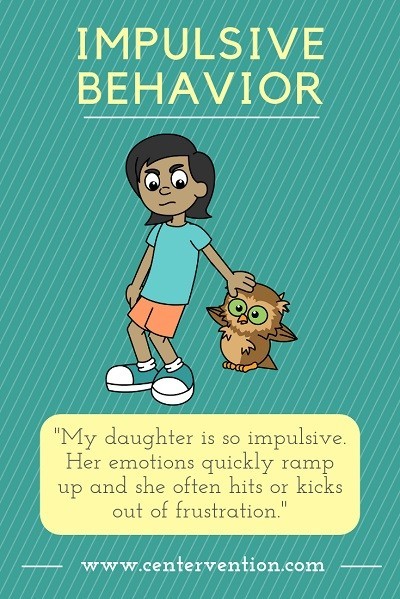
Q: My daughter is so impulsive. She’s constantly getting into trouble for things like grabbing toys away from friends at school or during playdates and interrupting her older sister even after we’ve told her to leave her alone. When she gets angry, her emotions quickly ramp up and she often hits or kicks out of frustration.
How do I help my daughter curb her impulsive behavior?
Impulsive behavior is something we are born with
Consider an infant. When they want something—milk, a toy or their mother—they want it straight away.
“And if they don’t get it,” said Melissa DeRosier, clinical psychologist and CEO of 3C Institute, “they are going to let you know about it.”
It takes time for children to develop the capacity to keep their impulsive behavior in check and handle their emotions in a healthful way. And, for some kids, it takes longer than it does for others.
Some may just not be developmentally ready to learn it yet. For others, it may not be a skill that’s been encouraged. Perhaps their parent buys them the candy bar every single time they cry for it in the grocery store checkout line.
“It could be that they’ve been rewarded for that behavior in the past,” DeRossier said. “It could be learned.”
The skill, however, is a critical one for kids to acquire. Studies show that children who are able to control their impulses have better grades and higher test scores and, eventually, will do better as adults—less likely to struggle financially, abuse drugs and alcohol or be convicted of a crime.
“If you’re able to delay gratification, you are going to be more successful,” DeRosier said. “Socially, in school, career wise, relationships, pretty much anything.”
A lack of impulse control could be a red flag for attention deficit hyperactivity disorder and varies based on the age of the child. It’s normal, for example, for a grade schooler to play actively for a long time and do impulsive things, occasionally, when they’re excited, according to the American Academy of Pediatrics.
But their behavior could indicate an impulsivity problem when, for example, the child regularly cuts in to other kids’ activities or can’t complete chores. It could flag ADHD if they’re often talking and interrupting, making disruptive noises or plucking toys away from others, according to the pediatrician’s group.
For kids who need to bolster their ability to control their impulses, here’s what experts say parents can do.
Model it
If a child sees a parent reacting with impulsive behavior or a high level of emotion during a challenging situation, then they’ll also have a hard time settling down and controlling their own behavior, writes Dr. Laura Markham, a clinical psychologist and author of “Peaceful Parent, Happy Kids: How to Stop Yelling and Start Connecting,” in Psychology Today.
“One of the most important things you can do to help your child learn self-control is to regulate your own emotions, so you can stay calm and patient with your child,” she writes.
Make them think
DeRosier recommends parents help their kids think through their actions and consider the consequences. If they have a homework assignment that they don’t want to complete, ask them, what the outcome will be if they don’t hand it to their teacher the next day. How will that make them feel?
“It’s a process of making that internal consequence and decision-making process external, so children can practice it and then it will become internal,” she said.
Have fun with delayed gratification
Holding off on eating that cupcake or playing with a toy until their brother is done with it might not be “fun” for a child. But Amy Morin, a psychotherapist and author, writes that it can be an effective way to help kids with impulse control. Morin recommends rewarding your child’s good behavior with tokens, which can be turned in for fun activities.
“Create small incentives that only require one or two tokens as well as big rewards that require 20 tokens,” she writes in VeryWellFamily.com. “Then, encourage him to save up his tokens for bigger ticket items like going to the movies. Saving up for bigger rewards will help him practice delaying gratification. That’s an essential skill that will help him resist temptations that may lead to impulsive choices.”
Get physical
“Exercise and movement affect focus and attention by boosting levels of dopamine, norepinephrine, and serotonin in the brain. Regular physical activity also improves concentration and motivation, decreases hyperactivity and impulsivity, and improves memory.”
Michelle Anthony, child development researcher and expert, via Scholastic
Give them ownership
“While you can’t accelerate his maturity, you can provide him with opportunities to take on ever-increasing levels of responsibility, whether it’s helping you carry in groceries, choosing where to plant the sunflowers, or deciding whether to add cinnamon to the cookies you’re making together. In other words, look for moments when your [child] gets to step into bigger shoes.”
Susan Stiffelman, family therapist and author of “Parenting Without Power Struggles,” via Huffington Post
Play games
“Popular children’s games … can be a big help teaching younger children the ability to stop, wait or follow instructions. Think Red Light, Green Light. The goal of the game is to be the first to cross the finish line, but you’re called out if you move on the red light. The child with impulse control challenges will have to work harder to stop at the proper time, but it’s great practice. Simon Says and Follow the Leader are games that help develop a young child’s ability to pay attention and follow directions. And we know a secret: Although it’s fun to play these kinds of games at school, it’s even more fun to play them with Mom, Dad, Grandma or Grandpa.”
James Forgan and Mary Anne Richey, authors of, The Impulsive, Disorganized Child: Solutions for Parenting Kids with Executive Functioning Difficulties